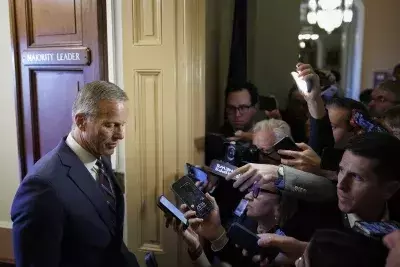
The U.S. Senate has taken a significant step toward ending a protracted government shutdown, now in its 41st day. With a 60-40 vote, the chamber approved a continuing resolution designed to restore operations for numerous federal agencies and secure funding for specific programs through January 30, with some extending until the end of next September. This legislative action, however, faces a critical hurdle as it moves to the House of Representatives, where its ultimate fate remains uncertain.
The resolution's approval in the Senate signals a potential breakthrough in the weeks-long stalemate that has severely impacted federal workers, disrupted essential services, and created economic uncertainty. The measure includes provisions for backpay for federal employees, protection against further layoffs until January, and full funding for the Supplemental Nutrition Assistance Program (SNAP) through September 30, 2026. This bipartisan agreement emerged from intense negotiations, with seven Democrats and one independent senator joining the majority of Republicans in support. Notably, Senator Rand Paul, a Republican from Kentucky, cast the sole dissenting vote from his party.
Despite the bipartisan nature of the Senate vote, the legislation's journey to becoming law is far from over. A key point of contention is the exclusion of an extension for Affordable Care Act health insurance premium subsidies, a demand many Democrats have staunchly upheld. Senate Majority Leader John Thune, a Republican, has pledged a separate vote on the subsidies by mid-December, a promise that has not entirely assuaged Democratic concerns, especially after recent electoral gains that empowered the party.
The House of Representatives now holds the power to pass or reject the bill, and House Speaker Mike Johnson has urged members to return to Capitol Hill for the vote. While Johnson expresses confidence in the bill's passage and President Trump's readiness to sign it, opposition is expected from both Democrats, who feel the deal concedes too much on healthcare, and some hardline Republicans. The ongoing debate underscores the deep political divides that have characterized the shutdown, leaving the nation's immediate financial stability hanging in the balance.
The Senate's approval of the continuing resolution marks a crucial development in the effort to end the government shutdown, offering a path to normalcy for federal operations and providing relief for affected workers and programs. However, the legislative journey is far from over, with the House's vote and lingering political disagreements, particularly concerning healthcare subsidies, presenting significant challenges that could still prolong the crisis.
